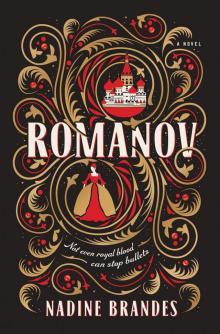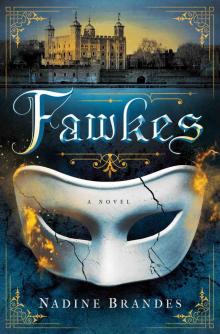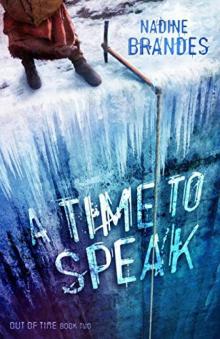- Home
- Nadine Brandes
Romanov
Romanov Read online
Dedication
To all those who have experienced hurt,
and then dared to hope, dared to forgive, dared to live.
You are proof that light will always prevail.
Contents
Cover
Title Page
Dedication
Aside
1
2
3
4
5
6
7
8
9
10
11
12
13
14
15
16
17
18
19
20
21
22
23
24
25
26
27
28
29
30
31
32
33
34
35
36
37
38
39
40
Author’s Note
Discussion Questions
Acknowledgments
About the Author
Advance Praise for Romanov
Also by Nadine Brandes
Copyright
Aside
My blood is my crime.
If you look at it, it’s still red. If you touch it, it’s still wet. But if you listen to it, it speaks a single name in a pulsing chant.
Romanov.
Romanov.
Romanov.
For that name alone, bound to my blood like a Bolshevik is bound to the Russian Revolution, I am destined to die.
Because not even royal blood can stop bullets.
1
April 25, 1918
Tobolsk, Russia
I watched my diaries burn.
Pages curled in on themselves, like spider legs accepting death. My past—my stories—turned to ash and tendrils of smoke. But I would not weep for them. The Bolsheviks could take far more precious things from me. I would not give them my tears.
I shoved another diary into the white-tiled stove that filled the corner of the bedroom I shared with my three older sisters here in Tobolsk. Here in exile. A photo slipped free from between two pages, as if putting forth a last attempt to escape its fate. I picked up the black-and-white portrait.
Tired, hooded eyes, a long, dark beard, and his hair parted meticulously down the middle: Grigori Rasputin. Our friend. Our spell master. He healed Alexei, he counseled Mamma, and he had been about to teach me spell mastery . . . until they shot him. The Bolsheviks shot him as easily as they threw back a shot of vodka at the end of the day. Or the beginning of the day, depending on how many deaths weighed down their hands.
Now they were coming for us.
I threw Rasputin’s photo into the fire. That photo, more than any other, could get me in the most trouble if the approaching Bolsheviks conducted a search. Evidence of our connection with the spell master would work against us. And they were searching for any reason to condemn Papa, no matter that he’d abdicated the Russian throne.
I snatched my book on spell mastery from my bedside table and shoved it on the bottom of our small bookshelf with the other volumes. It was a German translation—one the Russian guards likely couldn’t read—and I’d rebound it with the cover from a German book of folktales. Still, they’d find it if they tried hard enough.
The clip, clip, clip of Papa’s polished boots sounded down the hallway. They passed my door, stopped, and then returned. The door opened, and his calm beard-and-mustached face turned toward me. “Nastya. They’re here.”
I shut the stove door and stood. Papa held himself straight and regal, despite his short stature. We walked down the chilled corridor together. In silence. Ex-tsar and ex-princess. We passed Alexei’s room and I glanced in. My thirteen-year-old brother lay thin and haggard on his bed, his skin yellow and eyes like dark bulbs in his skeletal face. He didn’t look at us as we passed by.
I balled my fingers into fists. I would heal him. No matter the Bolsheviks’ quest to murder all spell masters or if they searched us or if they sent us back to St. Petersburg. I would study spell mastery and find a cure for Alexei.
Noise came from the entryway and I focused forward. The strain of the Bolsheviks’ arrival was overshadowed by the anxiety of not knowing why they were coming.
We joined our guards—the ones who had been with us the past year and become our friends—in the entryway. The weathered rug cushioned our weight once we stopped.
A new man stood in the doorway, filling it like a giant shadow. He was tall with pale skin, black eyes, and an angular face beneath a mass of curly dark hair. I’d seen his type before, at the few lavish balls and parties Mamma had allowed us to attend. The type who stood on a pedestal in his mind. Usually those types were the scheming grand dukes or political leaders more interested in social climbing and control than dancing or conversation.
For some reason they never seemed to like me.
The warped windows into the courtyard distorted—but did not conceal—the lines of Bolsheviks standing at attention and waiting. Our chickens pecked at their valenki boots, tearing off bits of grey felt. The Bolsheviks didn’t even blink. There had to be over a hundred of them! Why so many?
Papa strode toward the dark-eyed man and extended a hand of greeting. “Welcome to Tobolsk, Commandant.”
The commandant did not shake it but instead announced in a loud voice, “I am Yakov Yurovsky. By order of Lenin’s Central Committee, the Romanov family is to be relocated.”
Relocated? Could it be that they were going to send us home? We’d been holed up in this cramped house for a year, unable to enter town or breathe more than a few hours of fresh air every day. I longed to be free in the forests again, picking opyata mushrooms, growing a life . . . dabbling in spells.
I cupped the small flare of hope in my palms and waited for more explanation.
Papa lowered his unshaken hand and asked calmly, “Where?”
“That is to be decided.” Yurovsky’s flat monotone caused the spark of hope simmering against my skin to wither.
“When?” Papa asked.
“Immediately.”
Mamma sat at the edge of the room wrapped in thick blankets and a steely expression despite her own illness. She straightened in her chair. “But our son is too ill to travel.”
“I am ordered to remove the former tsar without delay.” Yurovsky clipped his heels, sending mud from his boots to the entry rug. “The rest of the family is not my concern.”
I gasped and it echoed across the room until it turned Yurovsky’s gaze toward me. He would take Papa without us? Our only solace during this time of exile had been our union. Our strength as a family. The bonds of our Romanov blood keeping us from despair.
Please. Please no.
Papa lifted his chin, and the guards in the room who had come to respect him all seemed to stand taller. He resembled a tsar again. “I will not be separated from my family.”
“Then you will be taken by force.” Yurovsky did not need to gesture to the Bolsheviks outside. We were outnumbered. “You may bring traveling companions, but we will leave by morning. The rest of your family will follow once the boy is . . . well.” He almost said dead. That word hung heavier in the room than any other.
Leave. Tomorrow. By force.
Yurovsky’s words were final. My control slipped through my fingers, threatening to break out in the form of a scream. They couldn’t separate us! Why? Why must they take Papa away so urgently? And without telling us where?
Yurovsky turned on his heel and addressed three Bolshevik soldiers. “Oversee the packing.”
Perhaps Papa sensed my rising outrage, because he took my arm and steered me away. “Come, Nastya.”
“They cannot separate us,” I hissed as we left the Bolsheviks behind. “You cannot let them!”
“This is not the time to resist.”
“But where? Where are they sending you?”
“Probably to Moscow for trial.”
My throat burned hotter than the scorched pages of my diaries. “Curse those Bolsheviks. I ought to poke holes in the soles of all their boots!”
A smile entered Papa’s voice, hidden by his mustache. “That is why you must stay, Nastya. To cheer everyone up with your impish mischief.”
I ground to a halt. “I am to stay?” He’d made up his mind already?
“There are things I need you to do here—”
“Nikolai . . .” Mamma caught up to us, her composure held together by only the clasp of her brittle fingers on her worn handkerchief. Papa went to her.
I stomped away from them, from the pain, leaving him to make the necessary arrangements and decisions he needed to focus on. None of which involved stitching up the gash in my heart.
But I wasn’t the only one with a gaping wound inside. We would all have to carry this pain.
I found myself entering Alexei’s room and plopping by his bedside as he coughed—a weak, wheezing thing. But that was much better than the violent hacking last week that had caused a hemorrhage and damaged his kidneys.
Alexei had saluted death before. His hemophilia never promised him a long life. But when Rasputin had been alive, he could heal Alexei’s injuries with a single word, even from a different city through the telephone line.
Now there was nothing to save Alexei except his own will to live.
That would change if I could learn more about spell mastery. I itched to pick up that German spell book and read it right under the Bolsheviks’ noses.
Alexei’s coughing subsided and he blinked his hollow eyes toward me. “You look gloomy.”
I smiled, relieved by the one family member who understood that banter could dispel even the darkest mood. “It’s because you’re being so lazy, staying here in bed. I’ve had to do all your chores.”
“Lucky. Being lazy is incredibly boring.” He winked, but it seemed tired. “You’ve likely killed my poor chickens by now.”
“They had a hearty breakfast of boot felt.”
“Poor creatures. To be under your care is a frightening thing.” He nodded his chin toward the door. “What’s happening out there? I know the Bolsheviks arrived, but no one has told me anything.”
Every time Alexei was sick, the family avoided negative conversation around him. I understood the concept—that despair could affect his will to live or might send him into a gloom that slowed his healing.
But Alexei and I had a mutual understanding never to keep things from one another. We understood that being left in the dark was far more despairing than dealing with the weight of dark news. “They’re taking Papa away.”
Alexei, having spent time with soldiers on the front line when Papa was still tsar, took in the statement with a deep breath. It turned into a cough and I handed him the glass of water from his bedside.
“What . . . what about me?” he finally managed. “I must go, too. I am the tsarevich.”
“You’re not well enough.” I held back my wince.
Steel entered Alexei’s features. His body. His will. “Not yet. But I will be.”
And that was why he would have made a brilliant tsar. “They are likely sending him to trial in Moscow. Papa will leave tomorrow morning and we will follow once you are well.” I fixed him with a stern gaze. “The Bolshevik commandant thinks you’ll die. Survive so you can spit in his face.”
Papa’s voice came from the corridor. I shoved myself to my feet and hurried out, but not before I caught Alexei’s whisper. “Come back and tell me everything.”
Papa and Maria—my partner in mischief and only two years older—spoke quietly in the hall. Maria paled beneath her long brown hair, but she gave a brave nod and then headed toward our room.
I hurried to take her place at Papa’s side. “What is the decision?”
“Your mamma will join me,” Papa finally said. “Maria will come as her companion.”
Not me.
He must have been able to see the resignation on my face, because he cupped my cheek with his hand and it sparked the fuse that led to the burn of tears. “Tatiana will manage the household in my absence. You have your own role to play.”
So it was decided. As simple as that. Like a surgeon slicing a heart in two. My heart pumped a broken rhythm. Everything was happening too fast. I was about to be left behind. There were too many unknowns.
I grabbed his sleeve. “Is there no other way?” My plea might as well have been a shout to the corridor of guards. But I had no reason to hide my love for my family.
Papa sounded equally as desperate in his reply. “I cannot see one, shvibzik.” He guided me up the hallway, away from the guards. “When Alexei is well enough to travel, you and your sisters will join us.”
I opened my mouth to protest—how I loved protesting—but Papa added a seemingly unrelated question. “When was the last time you read Pushkin’s novels?”
My jaw snapped shut like the bite of a nutcracker. Pushkin. Pushkin. A brief moment passed as though he wanted to be sure I understood the undertones of his question. So much of my family’s conversation these days consisted of hidden messages and code words.
Pushkin meant “secrets.”
The burn of my tears was snuffed. I couldn’t hold back the sly grin that crawled onto my face. “I was planning on reading one today.” As soon as he left, I would slip to the library and find whatever secret he’d hidden there for me.
Papa glanced over his shoulder. No guards in sight. We stopped. “Nastya, you know the most about spells. I did not trust Rasputin as Mamma did, but I know he instructed you and he likely did it well.” Code words were abandoned.
“He only ever had time to show me the basics.” And hardly even that.
“That is still more than your siblings. This is why you must guard the family Matryoshka doll and bring it with you when you join us.”
My throat cinched. Thirteen years ago, I’d watched Mamma and him open a layer of that painted doll and release the now-forbidden spell that brought us Alexei. I’d not seen the doll since. “Dochkin made that doll.” Vasily Dochkin, Russia’s most respected and skilled spell master.
“Da. Do not let the Bolsheviks take it.”
My mind raced through questions and answers. After Rasputin, the people grew too suspicious of spell masters, convinced they could control minds. So the revolution began—forcing Papa off the throne and hunting down spell masters one by one.
“The Bolsheviks would use the doll to find Dochkin and kill him,” I surmised. “I must protect him.” The revolutionaries were fools. They knew nothing about spell masters. Spells from the old artists of Russia were now forbidden. I liked forbidden things.
“That is not why I am entrusting it to you.” Papa glanced over his shoulder. “This doll, Nastya. It may be our family’s only salvation.”
A familiar thrill twirled in my chest. Papa was depending on me and not my eldest sisters, Olga or Tatiana, because he knew I could do it. I was sneaky—they were too honest. “I will not fail you, Papa.”
He kissed me on the forehead. “You never do. Now go help Maria pack.”
I spun on my heel and strode down the hallway of the Tobolsk governor’s house as though I was, once again, Grand Duchess Anastasia Nikolaevna back in the Alexander Palace.
I could pretend away Papa’s abdication.
I could pretend away our exile.
And now that Papa had given me a mission, I c
ould—for the moment—pretend away the fear of never seeing him, Mamma, or Maria again.
I entered the bedroom that my sisters and I shared. Maria stood staring at her brown valise, looking far too vulnerable and unsure for her stocky eighteen-year-old frame.
I sighed and crossed the room. “You had to volunteer.” I pulled books from our shelf and stuffed them into Maria’s valise, making sure she had the essentials—Tolstoy, Dostoevsky, Turgenev, Chekhov. I tried to set my envy aside—I wished I were going. But then who would Alexei have?
Maria snapped out of her helplessness, as I knew she would if I forced literature on her. She took the books out and replaced them with a beaded gown. “I could not let Mamma face Papa’s trial alone.”
I tried to slip in two of the discarded volumes. How did she expect to dispel the boredom on the train ride without books? “You’ll not need an evening gown at a court trial, Maria.” Nor, likely, ever again. Why she’d brought the gown to Tobolsk in the first place made sense only to Maria’s flirtatious mind.
If we were lucky, the trial would allow us—the last Romanov family—to disappear into a quaint Russian village and live out the rest of our lives as the common people did.
“It is Moscow,” Maria stressed. “I would rather have a flattering gown on hand than old dusty books.” She dumped the volumes out and I managed to catch all but Dostoevsky, which slammed to the ground, spine up. My soul cracked right along with the crisp pages.
I picked it up. “Did you know Dostoevsky was exiled to Tobolsk for a time?” I held out the book. “It would be a bad omen to leave him behind.”
“Then you can bring the book when you join us.”
I screwed up my face, not caring that pouting was far beneath the maturity I should be showing as a sixteen-year-old princess. Well, ex-princess. “Whenever that might be.”
“We will see each other again, shvibzik.”
Her use of my pet name—“imp” in Russian—did nothing to ease my building dread. “You must write to me.”
“If they will let me.” Maria’s hands stilled. She leaned over the valise as though curling in pain.
“You need only smile at them and they’ll let you do whatever you wish.” I shoved parchment into the bottom of the valise, filling the role of the strong one. That was how we sisters worked. When one was weak, another picked up the strength. “You and Papa will befriend these Bolsheviks as you have the soldiers here in Tobolsk. Papa may have abdicated the throne, but we are still royalty. We are Romanovs. The bond of our hearts—”

 Romanov
Romanov Fawkes
Fawkes A Time to Die
A Time to Die A Time to Speak
A Time to Speak